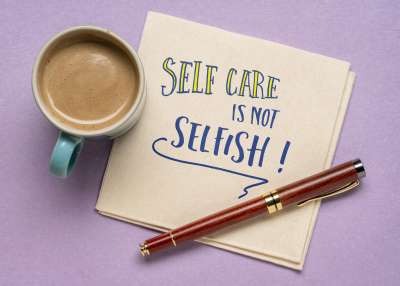Self-care is important: especially when you spend most of your time focused on the well-being of others.
As teachers, we often feel as though we lead multiple lives. We have our teacher persona and then our everywhere else persona. This can be exhausting, especially if we carry our stressors and workload from one world to the other! While living a double can be complicated, it's also beneficial for disconnecting from work in our personal time. Work-life balance can be hard to achieve, but it's possible!
See the tips below to make the most of your hectic life as a teacher and still feel fulfilled.

Exercise
Doctors tell you, your crazy friend who takes spin classes tells you, but you don't need to be told what you already know: exercise is one of the keys to wellness. There are so many proven physical and mental health benefits to exercise that you're missing out on if you don't get moving a few times a week.
Exercise is essential to support teachers' mental health. It is one of the only times during the week that I can push the thoughts about my students aside and focus on myself and my own health care. It's essential for wellness and to avoid teacher burnout to set boundaries around your thought life. You prioritize your students for the majority of your time; it's imperative to carve out time and space for your own mental health care.
If you find yourself burdened by thoughts like, I have kids, I don't have time, or the gym is too expensive, find a YouTube video and work out in your living room! You can even take a walk or a bike ride around your block. Lesson plans can wait; your physical health is a necessary investment in order to do your job. Getting outside is one of the best ways to cope with stressors that crop up during the school year.
Make Time to Socialize
The covid-19 pandemic taught us a lot about ourselves, one lesson being that we need human interaction and the support of a community to maintain optimal health. Professionals are referring to the time spent in isolation as the catalyst behind the mental health crisis we're witnessing among students and teachers alike. As great of a short-term solution as it was to have video conferencing platforms like Zoom to maintain connection, it's not quite the same as getting together in person.
Purposely schedule opportunities to gather and connect with friends and family, and stick to it. Having something to look forward to and spending some downtime with close friends is essential for the well-being of teachers and much-needed emotional support.
Lean Into the Right Professional Development Opportunities
Teachers are naturally lifelong learners, problem solvers and nurturers. While this time in history has become known for its teacher shortage, there are still many teachers who are still showing up in public schools, elementary schools, middle schools and high schools ready to invest in their school communities and school districts. Take advantage of any professional development provided in social-emotional learning or SEL to continue your professional learning. Not only will this type of training assist you in identifying issues in student mental health, but it will also provide the kind of mental health resources and access to mental health services you might need for yourself. Ask your school leaders if you're unsure where to find such PD opportunities.
"You prioritize your students for the majority of your time; it's imperative to carve out time and space for your own mental health care."
Get Involved Outside of Education
If you're like many teachers, you take on more than just your teaching job. Perhaps you work a few nights as a bartender, waitress, or sales associate. Maybe you babysit, tutor, or work at daycare on weekends. Whether you work a second job to meet a financial need or to fill your time differently, the opportunity can allow for a much-needed mental break from the responsibilities of teaching.
I currently teach fourth grade while also working three shifts per week at a clothing store, and I find it to be a welcome change. The extra money, adult interaction, and satisfaction of helping people help me feel fulfilled, and it also helps me genuinely appreciate time off! If you're like me and enjoy filling your life with people and activities, multiple jobs may provide a form of mental health support in addition to helping financially.
Think Before You Vent
Teachers tend to surround themselves with other teacher friends or school counselors who understand the same issues of astronomical workloads, problems with staffing, the mental health issues everyone has faced/ is facing this year and the past year, and the list goes on. I find that sometimes, venting with these friends can really help work through any stress or issues I may be having at school, but sometimes, it's better to talk about anything else. When I constantly think about my students and discuss them at length, it can lead to more worry! For the sake of your mental health, it is best to enjoy the company of those around you without always bringing it back to the classroom.
Don't Shy Away From Therapy
Unfortunately, going to therapy is not something that many people feel comfortable discussing. That needs to change. Therapy is not something people should be ashamed of. In fact, quite the opposite. You wouldn't feel embarrassed telling a coworker about going to the emergency room for a broken arm. You wouldn't feel strange discussing antibiotics for a sinus infection. Why should mental health be any different? If you are experiencing symptoms of depression or anxiety, loss of interest in things you once loved, a lack of engagement or connection, or simply feeling like having a qualified person to talk to would do you some good, I highly recommend going. You won't regret it.
Go to Sleep!
According to The Sleep Foundation, lack of sleep can affect mental health and vice versa. So a good night's sleep is more necessary than the luxury we've come to believe it to be. Shut off devices at least an hour before you'd like to fall asleep and establish a wind-down routine for optimal shut-eye. (If you need a little help with guided meditation, setting boundaries, or a little white noise, there's always an app for that.)
It's so important that teachers take care of themselves. If these tips have resonated with you and you're looking for more ways to invest in yourself, we have some more self-care suggestions and strategies here.
You can even sign up for our Teacher's Self-Care Newsletter to stay in the loop on what small changes you can make that make a big difference for a happy and healthy academic year.
















